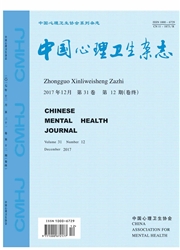

 中文摘要:
中文摘要:
目的:研究语言理解能力与心理理论测试成绩的关系和中文修订版心理理论测试工具在中国的适用性。方法:应用中文版心理理论测试工具和图片词汇测验测试哈尔滨市100名3~5岁儿童。结果:3-5岁各组儿童100%通过表情辨认测试,表情解释测试通过率分别为76%、97%、97%,“地点变换”错误信念测试通过率分别为36%、76%和93%,“内容变换”错误信念测试的通过率分别为15%、42%和59%。除表情辨认测试的通过率外,3个年龄组间各项测试的通过率差异有统计学显著性(X^2=11.11,24.79,12.82,P〈0.01)。按错误信念测试完成与否分组比较图片词汇测验IQ差异有统计学显著性,如地点变换、内容变换通过与否者IQ分别为104.9±16.9/97.0±15.8,160.7±17.6/99.7±15.9(t=2,22,2.07,P〈0,05)。结论:错误信念测试成绩与词汇理解能力有关,中文版心理理论测试工具在中国基本适用。
 英文摘要:
英文摘要:
Objective: To investigate the relationship between vocabulary understanding ability and performance of theory-of-mind tests of children and to confirm the applicability of Chinese revision of Theory of Mind Tests in China. Methods: 100 children aged from 3 to 5 years in Harbin City in China completed the Chinese revision of Theory of Mind Tests and Peabody Picture Vocabulary Test (PPVT) . Results: The pass rates of expression recognition'tests from 3 to 5 years groups were 100%, and that of 'expression reasoning'tests were 76%, 97%, 97%. There were 36%, 76%, 93% of children passed the place change'false belief tests and 15%, 42%, 59% of children passed the content change'false belief tests. From 3 to 5 years groups, significant differences of PPVT IQ were found between groups divided depending on different performances of false belief tests, such as that of children passed place change or not were 104.9±16. 9 vs 97.0±15.8, 106.7±17.6 vs 99.7±15.9 ( t=2. 22, 2. 07, P 〈0. 05 ) . Conclusions: The language understanding ability of children was related to the performances of false belief tests. Chinese revision of Theory of Mind Tests was aoolicable to Chinese children.
 同期刊论文项目
同期刊论文项目
 同项目期刊论文
同项目期刊论文
 期刊信息
期刊信息
